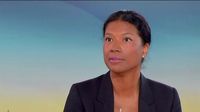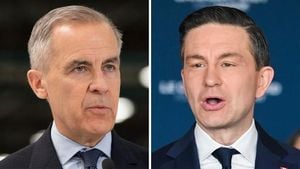As financial markets opened on Monday, April 7, 2025, a wave of concern swept through investors, prompting discussions about the potential for a lasting financial crisis. Economist Anne-Sophie Alsif, who serves as the chief economist for BDO France, shared her insights on the matter, asserting that the looming crisis could lead to significant fluctuations in the global economy.
During her appearance on the Quotidien show, Alsif addressed the economic repercussions of tariffs imposed by former President Donald Trump, emphasizing that these measures are not merely short-term issues but rather indicative of deeper, more sustained challenges ahead. She noted, "Investors believe there will be a lasting financial crisis with ups and downs," suggesting that the market's current volatility is just the beginning.
Alsif expressed surprise at the markets' lack of foresight regarding the impact of tariffs, stating, "The markets should have anticipated the impact of tariffs, as Donald Trump had already discussed them extensively." This sentiment reflects a broader concern that many investors placed unwarranted trust in Trump's business acumen, believing he would prioritize market stability over ideological commitments to tariffs.
As discussions unfolded, it became clear that the implications of these tariffs extend beyond immediate market reactions. Alsif highlighted that investors are increasingly convinced that the crisis will not be fleeting but will have a profound impact on global growth and trade. She remarked, "They think there will be a crisis that will be durable, with ups and downs. But, this will not be punctual and will have an impact on global growth and on exchanges." This perspective underscores the potential for a prolonged period of economic instability.
The opening of the financial markets on that day was marked by widespread concern, with analysts and investors alike grappling with the uncertainty that tariffs bring to the table. The reality that a stock market crash could be on the horizon adds to the anxiety, as the risk of a global recession looms larger. Alsif's analysis points to the interconnectedness of economies worldwide, suggesting that the fallout from these tariffs could reverberate through various countries and consumer markets.
One of the most striking aspects of Alsif's commentary is her critique of the market's reliance on Trump's promises. She indicated that many believed he would not jeopardize the markets for the sake of his tariff policies. This misplaced confidence, according to Alsif, has led to a situation where the markets are now facing harsher realities than anticipated. "The financial markets thought it would be cyclical and therefore that we would have punctual consequences not as significant as expected. We trusted the figure of Donald Trump, who is a businessman attached to the stock market, and that he would not sacrifice the markets for the ideology of tariffs. But this turned out to be false," she concluded.
The discussion around tariffs and their implications has become increasingly relevant as the world grapples with economic recovery post-pandemic. The potential for a stock market crash and heightened recession risks raises questions about how countries will navigate these turbulent waters. As Alsif pointed out, the repercussions of these tariffs are not isolated incidents; they are part of a larger narrative that could shape the global economy for years to come.
Looking ahead, it is essential for investors and policymakers to heed the warnings presented by economists like Alsif. The belief that the current market fluctuations are merely temporary could prove detrimental if the underlying issues are not addressed. As the situation evolves, the need for strategic planning and foresight becomes increasingly critical.
In conclusion, the insights provided by Anne-Sophie Alsif serve as a crucial reminder of the complexities surrounding tariffs and their far-reaching implications. As the financial markets continue to react to these developments, the global economy remains on a precarious edge, with many wondering just how deep the impact of these tariffs will ultimately be.





